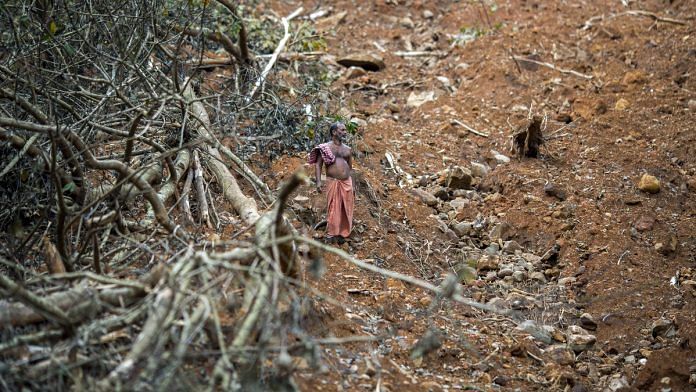New Delhi: About 20 lakh forest dwellers are set to lose their land in light of a recent Supreme Court order but many of them don’t know exactly why, according to several letters written to states by the Centre.
The apex court ordered on 13 February that the tribals or other traditional forest dwellers (OTFD) whose claims to forest land have been rejected by states under the Scheduled Tribes and Other Traditional Forest Dwellers (Recognition of Forest Rights) Act, 2006, should be evicted before the next hearing in July.
Around 19,39,231 people will be affected by this order, according to data available with the tribal affairs ministry as of 30 November 2018.
The Forest Rights Act was meant to serve as a vehicle “to recognise and vest the forest rights and occupation in forest land in forest dwelling Scheduled Tribes and other traditional forest dwellers who have been residing in such forests for generations but whose rights could not be recorded”.
It lays down several conditions for the rejection of claims, including that no one can be evicted from their land unless given a clear cause and avenue to appeal.
The Supreme Court order to evict land claimants across 19 states has come under scrutiny over several concerns, including the Centre’s allegedly meek defence of the Act and the rejection of claims by states without spelling out clear reasons, thus depriving claimants of their opportunity to appeal the decisions.
Assam, Bihar, Chhattisgarh, Goa, Gujarat, Himachal Pradesh, Jharkhand, Karnataka, Kerala, Madhya Pradesh, Maharashtra, Odisha, Tamil Nadu, Telangana, Tripura, Uttarakhand, Uttar Pradesh, West Bengal and Manipur are the 19 states mentioned in the order.
Also read: The tribals of MP have the power to swing elections. Not much else
Concerns raised in letters
The Supreme Court order came on a plea challenging the validity of the Scheduled Tribes and Other Traditional Forest Dwellers (Recognition of Forest Rights) Act, 2006.
Under the Act, claimants to land are those who seek ownership to a piece of forest land as tribals or other traditional forest dwellers (OTFD) as recognised under the law.
While activists and advocates for tribals and OTFDs have raised an alarm over the large number of rejections over the years, the Ministry of Tribal Affairs has flagged this concern for almost a decade.
On 7 September 2010, in a letter to Tripura, then tribal affairs minister Kantilal Bhuria expressed concern over complaints received by the ministry from tribals who were being evicted from national parks and sanctuaries “without their rights under the act being decided one way or the other pending determination…”
Two years later, in May 2012, the ministry issued another letter to chief ministers of all states concerned, observing that the implementation of the “watershed legislation” was poor.
“In particular, rejection for claim of rights is still very high, and rejected claimants are not informed about the reasons for rejection or given an opportunity to appeal against the rejection,” former tribal affairs minister V. Kishore Chandra Deo had said.
The latest letter — sent to the chief secretaries in June 2018 — said that “non-communication of rejection (of claims) and when conveying rejections not assigning reasons for rejection at each level results in preventing claimants from exercising their right to appeal/review.”
The ministry further expressed alarm over forest officials citing the apex court’s orders to evict people whose claims were rejected under the FRA but were awaiting a review — something the law unequivocally prohibits.
The ministry reminded the chief secretaries that states were supposed to review rejected claims suo motu and ensure that nobody was evicted during pendency of review.
The letter further observed that forest officials kept raising frivolous objections causing rejection of claims.
For instance in Kerala, a new term — Ecologically Fragile Land — was “invented” for rejecting claims.
“Claims cannot be withheld or rejected on such invalid grounds,” the letter read.
It further said that forest officials needed sensitisation and training on the FRA rules, the letter said.
Case history
The case in the apex court pertains to a 2008 batch of pleas filed by wildlife conservation societies — Wildlife Trust, Nature Conservation Society and the Tiger Research and Conservation Trust — and retired forest officials challenging the constitutional validity of the FRA.
In 2009, all similar pleas in various high courts were transferred to the apex court.
Advocates and activists representing tribals suggest that mid-way through the course of arguments, the tenor changed.
Odisha-based activist Tushar Das said, “From debating about the constitutional validity of the FRA, the hearing has shifted to issues of rejected claims with tribals and other traditional forest dwellers, whose claims have been wrongfully rejected, being looked upon as encroachers, and their eviction.”
Also read: Forest Rights Act is quite clear on genuine forest dwellers, but states are letting it down
Advocates representing the Wildlife Trust were quick to point out that even though there were no senior lawyers present, the Centre and the tribal ministry were adequately represented.
In January 2016, the top court had directed the states to file an affidavit, stating what was done to the people whose claims were rejected.
When the case came up for hearing in 2018, most states didn’t provide reasons for rejections. The ones that did most frequently cited “lack of evidence” as the reason.
States like Gujarat and Maharashtra said several cases were still under review and they were at different levels of disposal.
Some of the reasons for rejections included claims filed by minors or multiple claims by one applicant, applications by non STs/OTFDs, claims for non-forest land and encroachment post the 2005 cut-off date.
Odisha was the only state to categorically provide reasons for rejections.




One hopes a humane solution can be found. These are the original residents of the forests. Even slum dwellers in Bombay are not evicted during the monsoons.